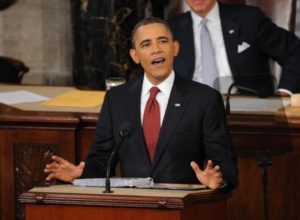 In Obama’s third State of the Union, foreign policy and defense achievements were only used as opening and closing components to his one hour long speech. This was not a surprise considering the current domestic and economic situation of the U.S., as well as President Obama’s successes in foreign affairs.
In Obama’s third State of the Union, foreign policy and defense achievements were only used as opening and closing components to his one hour long speech. This was not a surprise considering the current domestic and economic situation of the U.S., as well as President Obama’s successes in foreign affairs.
Obama opened his speech by listing his accomplishments in foreign policy: return of all combat troops from Iraq; the end of the threat from Osama Bin Laden and the perpetual attacks against his operatives around the world; and the progressive removal of troops from Afghanistan. These foreign policy and military successes were used as a transition towards the core of his speech: how to transform America and shape a strong economy.
Obama began the core of speech with a reference to the end of WWII, when the U.S. “built the strongest economy the world has ever known.” He then declared that the “defining issue of our time is to keep this promise [American dream] alive.” Very quickly President Obama launched his attack against Wall Street and the unregulated economy. It was no surprise that this State of the Union was directly oriented around domestic economic problems such as health care, education, tax reform, manufacturing, immigration, consumer protection, financial regulation, and energy independence, among other issues.
Interestingly, President Obama spent a considerable amount of time on the theme of reform of the government and the American institutions. As a politician and individual, Obama strongly believes in the role of institutions. Despite this philosophical conviction, he rightly declared that “Washington is broken.” His institutional and government reforms did not generate a large support among elected officials present in the House. President Obama talked about the corrosive influence between money and politics. He even called for bills to end the legal practice of insider trading amongst members of Congress, limit and monitor economic conflict of interests, and control lobbying of Congress. He also discussed the need for a reform of the executive branch.
The last segment of his speech went back to foreign policy, completing a virtuous circle by underlining the killing of Osama and Al Qaeda’s threat around the world. Then, Obama spoke of troops’ return from Afghanistan and the progressive transition of power to the Afghan government. He mentioned the Arab Spring in order to discuss the end of old authoritarian regimes such as Qaddafi’s Libya, and soon, Assad’s Syria. His claim was that even with an uncertain transformation and political direction in the region, the U.S. will advocate for the same values shared at home: human rights and democracy. President Obama also reinforced his opposition to the Iranian nuclear program. His main strategy remains embedded in the power of diplomacy, which has generated international consensus and lead to the increasing isolation of the Iranian regime. America is determined to prevent Iran from obtaining nuclear weapons and Obama, “will take no options off the table.” However, a peaceful solution would be preferred.
For Europe, the turning point was obviously when Obama defined the U.S. as being a “Pacific power.” Europe seemed nonexistent and was never mentioned- not even the Euro crisis. President Obama did not talk about the shared success in Libya with NATO. Two scenarios can be gleaned from the absence of Europe in his speech: either, it is time for Europe to pick up the burden; or Europe was yesterday’s concern. Let’s face it, this was not a surprise.
In the concluding segment of the speech, Obama shouted that “America is back,” which lead to resounding applause. He argued that those who speak about the decline of America “do not know what they are talking about.” The statement put me in a strange position; I teach a course this semester on the decline of Great Powers, and the U.S. is one of them. Hopefully, my students were not watching the State of the Union; otherwise I may end up with a revolution in the classroom! Obama went on to declare that U.S. soft power and influence is still powerful across the globe, and the U.S. remains the leading world power. The closing statement of his State of the Union was based on a call for indivisibility. In order to foster unity, promote success and fulfill American promises two elements were advanced: the protestant ethic and the military.
This State of the Union was a solid speech, incorporating clear and feasible goals for the coming years as well as elements of his reelection program. For Europe, this 2012 State of the Union is one more indication that the U.S. is looking East; Obama has always looked towards Asia for personal and strategic reasons, rightfully so. Europe is and will remain America’s strongest ally. However, it is time for Europe to finally accept its role and responsibilities, without the U.S. looking over its shoulder.